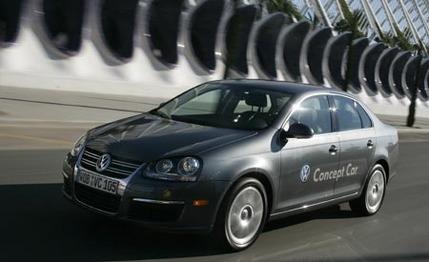 First Drive Review
First Drive Review
Click here to read our latest road test of the Jetta TDI. (Jan 2008)
Amid the looming hordes of European luxury automakers planning a North American compression-ignition invasion in the next couple years, humble Volkswagen has announced its plans to return the Jetta TDI to the diesel dogpile in the spring of 2008. Powered by a new 2.0-liter four-cylinder making 140 hp and 236 lb-ft of torque, and either a six-speed manual or DSG automated manual transmission, the 2008 Jetta TDI will be cleared for sale in all fifty states.
Some of the earlier diesels to make it to our shores over the next few years will only be available in 45 states; California, Maine, Massachusetts, New York, and Vermont have all adopted stricter emissions regulations for diesels that bar some vehicles from entry. Using technology developed under the BlueTec cooperative formed by Mercedes-Benz and Volkswagen, the Jetta TDI will slip by these stricter regulations without resorting to a urea-based exhaust treatment, as many BlueTec labeled models will.
Nitrogen oxides (NOx) are, along with particulate emissions (soot), the biggest hurdles facing diesels in the U.S. Most BlueTec vehicles will control NOx by injecting a urea-based solution called AdBlue into the exhaust system upstream of a catalytic converter that specifically targets NOx. In that catalytic converter, the ammonia in the urea reacts with the NOx in the exhaust gas and neutralizes it into nitrogen and water.
Volkswagen's Jetta TDI will manage without a urea injection system by using a NOx-storage catalyst. Like the particulate filters in place on this car as well as other diesels, this catalyst is basically a trap that temporarily holds the offensive emissions. Periodically, the engine will switch to an air-fuel mixture that will burn off the material in the traps.
We had a chance to drive a near-production Jetta TDI and were pleasantly reassured by the transparency of not just the BlueTec technology keeping the car clean, but the diesel engine overall. Horsepower in this new 2.0-liter common-rail diesel engine is up 40 percent over the previous 1.9-liter four-cylinder, with torque up 33 percent. Those figures mean an increase in drivability of about 500 percent. With the previous engine, the best performance we managed to coax from a Jetta TDI was a sluggish 10.3 second 0-60 wheez. The additional power and torque produced by this new, cleaner engine bring that number down to somewhere in the low- to mid-eight second range. Under less aggressive feet, the TDI's prodigious torque effortlessly whisks the Jetta away from stops and around traffic.